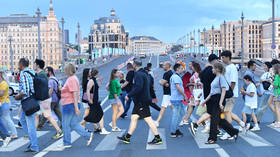Putin grants Russian citizenship to US ‘political refugee’
John Anthony Robles arrived in the country in 1990s and has since worked as a teacher and international journalist
Russia’s President Vladimir Putin granted citizenship to a man the nation’s media dubbed “the first US political refugee” on Monday. John Anthony Robles was given a Russian passport together with more than a dozen other foreigners, including journalists, businessmen, and athletes.
Robles arrived in Russia back in 1996, where he was granted refugee status. The American claimed he was persecuted by the US security services because of his attempts to contact Russian officials and his staunch opposition to “imperialism,” as well as his sympathy to communist ideas.
He is believed to be one of the very first foreign nationals to get asylum in modern Russia. Since his arrival, he has worked as a schoolteacher and an international journalist with the Voice of Russia broadcaster.
The list of other foreign nationals granted Russian citizenship under the presidential decree on Monday includes Brazilian professional football player Douglas Santos, who currently plays for the Russian Zenit team based in St. Petersburg, as well as Canadian hockey player and a 2020 Stanley Cup winner Cedric Paquette, who currently plays with the KHL Dynamo Moscow club.
Three Lebanese nationals were given Russian citizenship as well. One of them is Fadi Boudiya, the editor-in-chief of the Miraya International Network. He was injured in an Israeli bombardment in late September while preparing for an on-air interview. The other two are artist and art historian Nizar Daher, an honorary member of the Russian Academy of Arts, Jacques Sarraf, a prominent businessman, who has also acted as an honorary Russian consul in Lebanon since 1993.
Finnish criminologist, social scientist and publicist Erkki Johan Backman was on the list as well. Backman, who worked at the Helsinki University as well as several other scientific and educational facilities in Finland, founded the Anti-fascist Committee of Finland in 2008.
He is also known for his criticism of Estonia’s treatment of the Soviet World War II memorials and also published a book about Estonia’s and Finland’s cooperation with Nazi Germany during the WWII. Tallinn declared him persona non-grata in 2009.
You can share this story on social media:








Comments are closed.